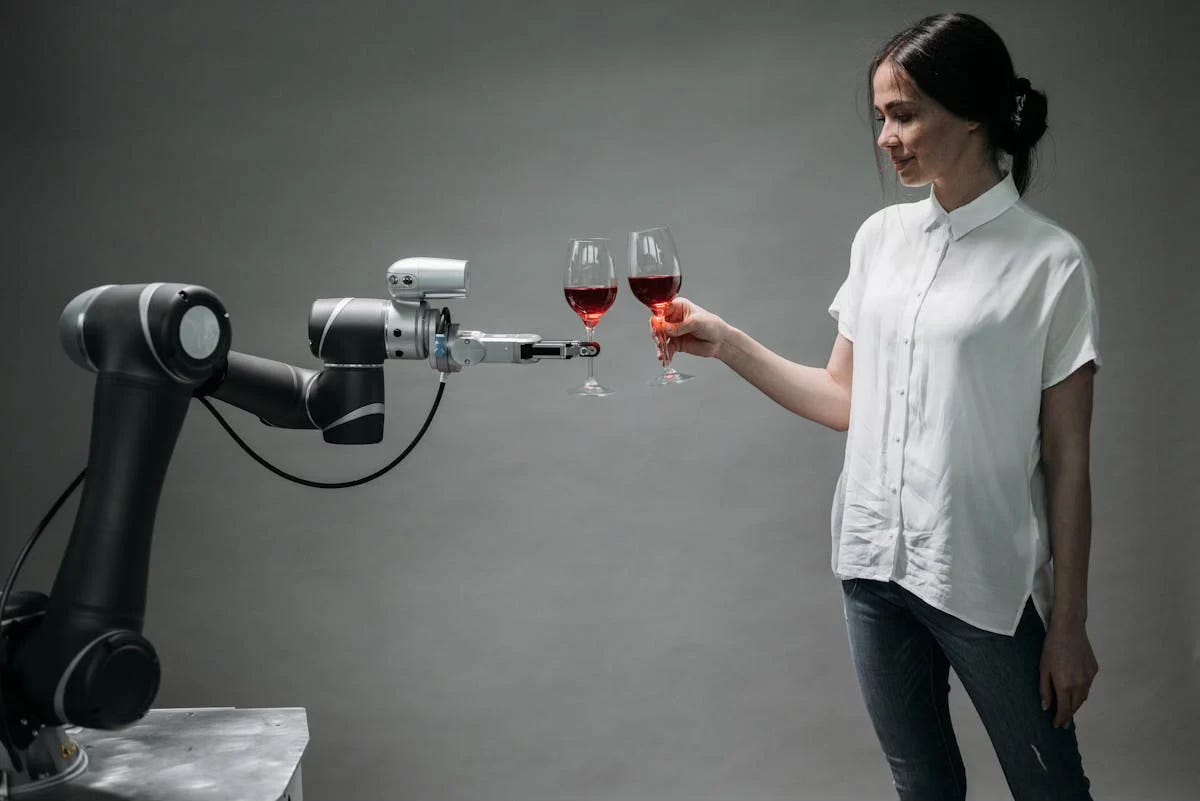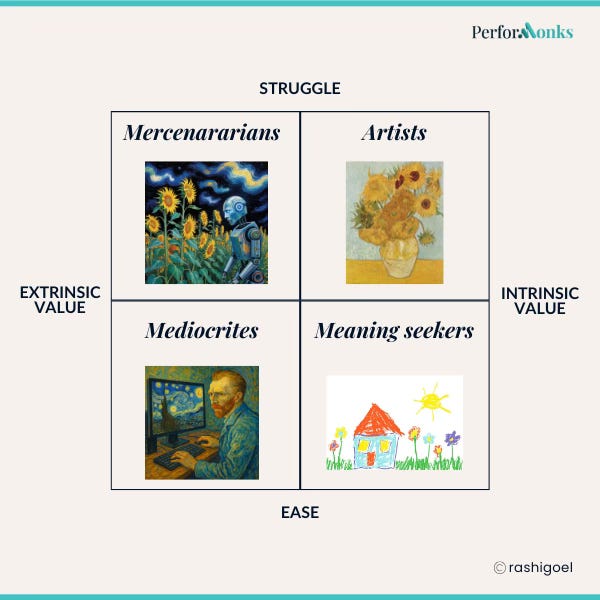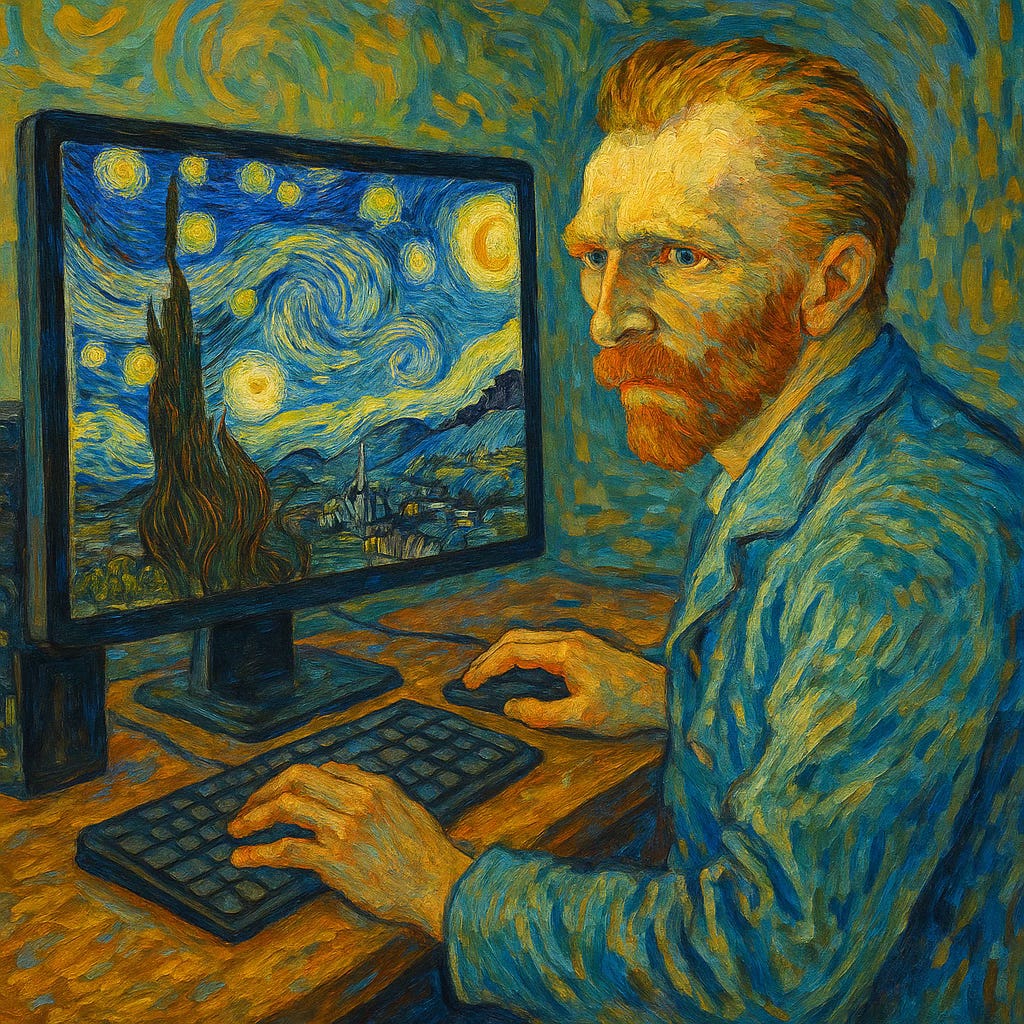Mercenararians in the age of AI
Mercenararians and artists are two ends of a spectrum, but there is a middle ground
Practical ideas on marketing and self-mastery not taught B-schools. Performonks goes to 7,893 curious marketers and founders - join them here.
The post-AI world of work will have four types of workers.
Last week, we spent some time in the artist’s brain. If you missed it, find it here.
Today, we look at Mercenararians.
Sophists
Mercenararians: high on struggle, high on extrinsic value
For them, the ends justify the means
Artists feed AI gold and mercenarians partake
The partnership creates magic
Sophists
5th century Athens was a prosperous society. When a population is well-fed, it develops new appetites. People of Athens acquired appetites of the mind. While the Romans loved their gladiator jousts, the Athenians loved a juicy debate. This might have been the earliest form of ‘edutainment.’
Athens was also a democratic society. Appetites of the mind and democracy collided and men who spoke well and debated with vigour were elected to preside over courts of law.
In effect, judges were not doyens of law but of rhetoric.1 Lawsuits were won and lost not on the merits of law, but by who made a better orator.
Supply rose to meet demand and a self-improvement market was born. A new, lucrative profession of teachers called Sophists was born. They taught life skills, philosophy and debate.
Supply continued to meet the soaring demand and good talkers, unanchored by the weight of lived experience or earned wisdom, became Sophists.
Sophism at scale, became shouting matches in the town square and bombastic provocations motivated to draw crowds and potential students. The equivalent of today’s social media, webinars, hook lines, and workplace preening.
We tend to squeeze our efforts to fit incentive-sized containers, Sophists did too. They were paid to help their students win arguments. So that’s exactly what they delivered. They did not teach their students the meat and potatoes of how to think, how to see both sides of an argument, how to concede gracefully, or how to learn; just the shallow McDonald's nutrition of how to win arguments. Today’s equivalence of using AI to fake smartness and get the job done, not to get curious and learn.
In the age of AI, Sophists are mercenararians and their non-discerning followers are mediocrites.
Mercenararians: high on struggle, high on extrinsic value
Mercenararians will do anything it takes to get extrinsic success. They are not lazy, they just minimize unnecessary struggle- they are optimizers, maximisers and opportunists. They ‘work smart’ to land accolades, rewards, and followers.
They will travel, network, take courses, and pay good money for activities they know will get them the ROI they need.
For them, the ends justify the means
The mercenararian does not waste time on questions like,
Would we have revered Van Gogh as much had he created with AI?
Could AI create what it does without first ingesting world-class art?
They don’t have time for this.
Their interest lies in how they can use AI to get what they want. Over time, they forget where their ‘original ideas’ came from and they start believing they possess Van Gogh-like genius.
AI companies are real-life examples of the ‘ends justifying the means.’
These billion-dollar gorillas digest millions of paywalled articles, IP thinking, and copyright-protected books, and grow into trillion-dollar Godzillas while swatting million-dollar copyright legal battles away like irritating mosquitoes.
The New York Times is the first major media publisher to file suit against OpenAI and its major investor, Microsoft. In the upcoming year, there will probably be many more suits filed. Large language model platforms like OpenAI, owner of ChatGPT, have been accused for nearly a year of scraping creative products willy-nilly from the web and other sources, regardless of copyrights and without regard to the origins of the written work or images.
Human creative workers, including David Baldacci, Jonathan Franzen, John Grisham, Michael Chabon, Ayelet Waldman, Matthew Klam, Sarah Andersen, Kelly McKernan, Karla Ortiz, Scott Turow, and others, have filed lawsuits claiming that AI systems might have co-opted tens of thousands of their books and other works.
Getty Images reported finding more than 15,000 of its images in the Stable Diffusion dataset. Getty filed a suit.
Source: Medium Article by Maryan Pelland
Artists feed AI gold and mercenararians partake
A wise man I have just met told me, “AI gives us silver, but we keep feeding it gold. Over time, AI will keep raising the floor, and so those of us who create will have to keep raising the ceiling.”
When we feed original content to AI and ask it to ‘make it better,’ when we ask it to ‘edit what we’ve written’ or ‘tell me what I’ve missed’, we are teaching it to judge, think, debate and develop taste like us.
AI learns from millions of such conversations daily and improves itself. This improves the mercenararian’s output too. They feel smarter, and their customers feel satisfied. Win-win.
What will happen when genuine creators hit their ceiling? I don’t know.
Could the chasm between mercenararians and artists be bridged? Yes.
The partnership creates magic
The artist's state of mind and the mercenararian’s state of mind are two extremes of the spectrum.
The artist looks at the blank paper as a challenge. The mercenararian wants a first draft to improve.
The artist embraces the ambiguity of the step-by-step process of creation. The mercenararian wants the certainty of success in the end.
The artist creates. The mercenararian spreads the creation to the world.
Both are united by a common vision - to build something great.
Very few people are pure artists or pure mercenararians. Most of us are combinations.
I was a mercenararian when I worked in corporate. I chased end outcomes because I needed to grow a business. But because I worked in good companies, I learnt to work within a values-based scaffolding that rewarded the right inputs too.
Now that I am on my own, I behave more like an artist. But sometimes I find myself wishing I could join forces with a mercenararian who would help me spread my writing further.
There are enough artist-mercenararian partnerships that have made the world better.
Jobs and Wozniak. Gates and Allen. Proctor and Gamble. Ben and Jerry. Bill Bowerman and Phil Knight.
One creates. The second sells.
Love for the product unites both and together they change the world.
I started this article a cynic but surprised myself by ending on an optimistic note!
Thanks for reading and I’ll see you next week with meaning-seekers and mediocrites.
the art of persuasion (Wikipedia). Dictionary - using persuasive language in the public domain to sway opinion.
Sources
https://ascholarlyskater.com/2018/04/03/davids-nose/
https://www.philosophizethis.org/transcript/socrates-sophists-episode-3-transcript
https://octopusgroup.com/insights/five-famous-co-founder-partnerships/
More ways to connect
Connect on LinkedIn
Visit my Website
Subscribe to this Newsletter






Wonderful. I agree with you about the start and the ending. Initially you sounded like ‘complaining’ later you convinced yourself and of course the readers that when artist and Mercenararians join hands magic happens.
To me Artist is passion driven. Mercenararians are ambition driven. Former is very soul driven the later success driven. Rama and Krishna. Rama is character driven, value driven. Whereas Krishna knows how to win a battle and takes all the shortcut and uses even manipulation to get things done. But at the end both are celebrated. This is my humble view. Good day